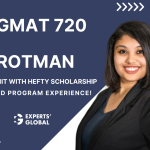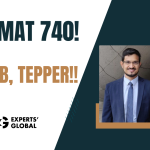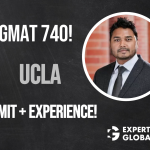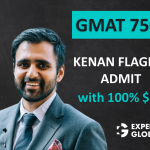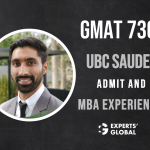Verbatim
Experts’ Global: Hi Vamshi, thank you for your time today! Could you share your journey with our readers?
Vamshi: Sure! I’m currently doing my MBA at Texas McCombs, and have an undergrad background in engineering. My career heretofore was spent at SAP, where I built the ground for a transition to product management. However, my day-to-day work was more technical than strategic in nature, and my growing desire to move into a business-focused role inspired me to take my MBA leap!
Experts’ Global: What part of your GMAT prep was most challenging and how did you overcome the same?
Vamshi: Sentence Correction was difficult for me. Changing my approach helped me, as I earlier used to regard Sentence Correction as a section that required me only to memorize some rules and then apply them. With time, I came to see that there was a larger logic at play. With some advice from mentors who had done well on their GMAT attempts, I was able to improve my performance.
Further, I began to take GMAT mocks with greater seriousness later in my prep. GMAT Club only offers six mocks, and through my research for additional resources, I found Experts’ Global’s 15-mock offering that helped me a lot!
Experts’ Global: What resources did you use for your GMAT prep and what advice do you have for other aspirants about the same?
Vamshi: I come from an engineering background, which meant that my Quant skills are high-pitched, but Verbal was difficult for me. I used the E-GMAT Verbal course to get my concepts clear. Thereafter, using Experts’ Global’s GMAT online course, I was able to get into more of the nuances of Verbal on the GMAT. In time, I was able to secure a 720 on my second GMAT attempt.
Experts’ Global: In hindsight, what mistakes did you make along the way?
Vamshi: About the GMAT, I used to think that there would be an optimal time at some point in my life when I could take the exam, but the truth is that one should just find time when possible to study for and attempt the GMAT. In my case, after the first GMAT attempt that got me a 680, I began prepping again and was getting 740s on my mocks regularly.
However, the intensity of my studies tailed off when the pandemic hit, and I ended up with a lower Quant score on my second GMAT attempt than on my first, even though I did get an improved 720. In hindsight, one should always give their best when focused on GMAT success.
Experts’ Global: What common mistakes should all GMAT applicants avoid?
Vamshi: For the GMAT, be realistic about the targeted score you can achieve, and do not try to brute force your way through the syllabus through constant practice and a steady procession of mocks. Ask questions from those who have already done well on the test, and work smart instead of hard all the time. Further, once you begin your GMAT prep, push through until you take the exam instead of postponing your studies due to work projects or personal occasions.
Experts’ Global: What was your MBA application experience like, and what things did you do right to succeed therein?
Vamshi: The MBA application process, at first glance, seemed quite overwhelming to me. In India, for an engineering student, the IITs are always the goal. However, for MBA aspirants, there are multiple good schools worldwide to choose from. Instead of losing track, I decided to focus solely on my GMAT and then proceed toward my application work and school selection.
At SAP, prior to applying for the MBA, I became one of the youngest product managers at the firm about five years after joining the company. To do so, I had to network and build relationships, and my habit of reaching out for guidance proved useful during the application process, as I connected with several alumni and current students from my shortlisted schools. This outreach also helped me understand what schools fit best with my profile and how they could help me achieve my individual ambitions.
Further, assistance from MBA admissions consultants Experts’ Global proved invaluable. Their well-structured processes provided me with milestones to keep my application materials flowing, and I was able to handle multiple application deadlines with ease.
Experts’ Global: With what aspect of the applications did you struggle the most and how did you overcome your difficulties?
Vamshi: The shortlisting of schools was a big initial hurdle. I wanted to go to a US-based MBA, but was unsure about which programs to target. With Experts’ Global’s help, I was able to identify a range of programs, some of which were more realistic and others were dream targets. Crafting a profile most relevant to each school’s culture was also a difficult process. However, having a trusted mentor to rely on helped me navigate these challenges.
Experts’ Global: How was your business school interview experience?
Vamshi: My Texas McCombs MBA interview was quite interesting. It was conducted by a second-year MBA student, who only had my resume as an introduction to my profile. My MBA interview prep stood me in good stead throughout the interaction.
The questions in the interview focused on finding out my fit for the school, because of the collaborative ethos of Texas McCombs. Further, I was asked why I picked McCombs, which gave me a chance to show that I had a genuine interest in the school and had done my research about its USPs. The third kind of question I was asked had to do with how the school would benefit my career growth. Overall, the interview allowed me to get a sense of the kind of peers I would meet in the MBA as well.
Experts’ Global: What was your MBA experience like?
Vamshi: An international MBA places you in an unfamiliar cultural and academic location, and once the program starts, things are quite hectic. Adapting to the pedagogy and academic culture itself broadens your perspective a lot. Further, meeting so many peers from such diverse backgrounds, ranging from military service to start-up activity, is a true boon for one’s professional growth. Overall, you learn to evaluate most business changes and general events from a commercial viewpoint.
The MBA allowed me to truly become a global citizen. I have made lifelong friends, gone on an exchange trip to Israel, and even collaborated with Google on a project.
Experts’ Global: What can you tell us about the post-MBA job search?
Vamshi: In India, during my undergrad, the placement process involved firms interviewing the candidates on-campus and recruiting directly from our college. However, the job search in the US was quite different. Not many companies come recruiting to campus and finding a good job mostly becomes about how good you are at networking.
Further, especially in the tech space, the interviewing and selection process can drag on for months in some cases, and you have to be quite patient with the employment-finding journey. Finding a job can be especially tough for international students as not many companies are willing to sponsor our visas.
A lot of the time, candidates are selected on the basis of their soft skills rather than their hard credentials. Hiring in the US takes into account how well a candidate would fit into a company’s culture and whether or not they would be pleasant to work with.
Experts’ Global: What is your final message to MBA aspirants reading this?
Vamshi: Take a free GMAT practice test before you begin your studies, as a diagnostic. Reach out to people who you know have done well on the test and get their advice. Never shy away from seeking professional help with your application work, because the MBA admissions game is all about outcomes. Lastly, try and enjoy the application journey and imbibe the lessons about yourself you will learn along the way!
Experts’ Global: Thank you for the useful insights you have provided us with today, Vamshi!
Vamshi: I hope they help other MBA applicants!

